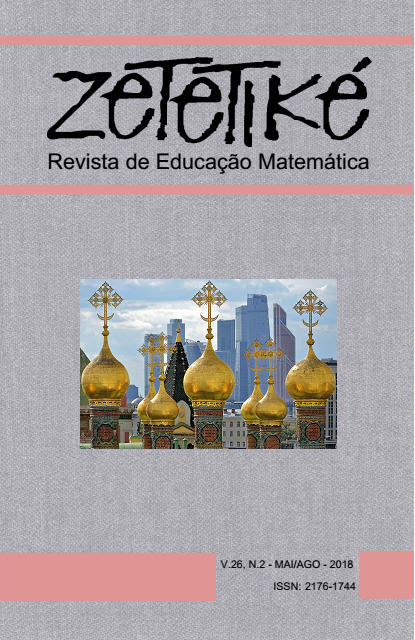Abstract
This study aims to analyze and discuss the academic project of the Professional Master's Program in
Mathematics in National Network (PROFMAT), highlighting above all the nature of the formative knowledge
that is disseminated (prioritized) by this public policy of teacher development. Based on the theorization of
Gimeno Sacristán, this project was considered in this article the official curriculum of this program, which was
analyzed from a critical curricular perspective and from researches that investigate the "specialized knowledge
of the mathematics teacher". The analysis showed that this postgraduate program privileges the dissemination of
codes and knowledge strongly linked to the practice of the professional mathematician while not addressing
knowledge referred by the specialized literature as being fundamental to the practice of the teacher who teaches
mathematics in basic education.
References
Apple, M. W. (2006). Ideologia e Currículo. Porto Alegre: Artmed.
Ball, D. L., Lubienski, S., and Mewborn, D. (2001). Research on teaching mathematics: The unsolved problem of teachers' mathematical knowledge. In V. Richardson (Ed.), Handbook of research on teaching (4th ed.) (pp. 433–456). New York: Macmillan.
Ball, D. L.,Thames, M. H. & Phelps, G. (2008). Content knowledge for teaching: what makes it special? Journal of Teacher Education, 59(5), 389-407.
Ball, S.J. (2015). What is policy? 21 years later: reflections on the possibilities of policy research. Discourse, 36(3), 306-313.
Bowe, R.; Ball, S. & Gold, A. (1992). Reforming education and changing schools: case studies in policy sociology. London: Routledge.
Baumert, J., Kunter, M., Blum, W., Brunner, M., Voss, T., Jordan, A., Klusmann, U., Krauss, S., Neubrand, M. & Tsai, M. (2010) Teachers' mathematical knowledge, cognitive activation in the classroom, and student progress. American Educational Research Journal, 47(1), 133-180.
Conselho Nacional de Educação (CNE). (2001). Parecer CNE/CES 1.302/2001. Diretrizes Curriculares para Cursos de Matemática, Licenciatura e Bacharelado. Brasília: Conselho Nacional de Educação.
Coordenação de Aperfeiçoamento de Pessoal de Nível Superior (CAPES). (2010). APCN – 2010. Aplicativo para Propostas de Cursos Novos. CAPES: Brasília.
Coordenação de Aperfeiçoamento de Pessoal de Nível Superior (CAPES). (2013). Avaliação Suplementar Externa do Programa de Mestrado Profissional em Matemática em Rede Nacional (PROFMAT). Brasília.
Bromme, R. (1993). Beyond subject matter: a psychological topology of teachers’ professional knowledge. In R. Biehler, R. Scholz, R. Sträßer & B. Winkelmann (Eds.). Mathematics didactics as a scientific discipline. The state of the art (pp. 73-88). Dordrecht: Kluwer.
Carrillo, J., Contreras, L. C. & Flores, P. (2013). Un modelo de conocimiento especializado del profesor de matemáticas. In L. Rico, M. C. Cañadas, J. Gutiérrez, M. Molina & I. Segovia (Eds.) Investigación en Didáctica de la Matemática. Libro homenaje a Encarnación Castro (pp. 193-200). Granada: Comares.
Fiorentini, D. & Oliveira, A. T. C. C. (2013) O Lugar das Matemáticas na Licenciatura em Matemática: que matemáticas e que práticas formativas? Bolema, 27(47), 917-938
Gatti, B. A., Barretto, E. S. S., & André, M. E. D. A (2011). Políticas docentes no Brasil: um estado da arte. Brasília: Unesco.
Hill, H.C., Ball, D. L., & Schilling, S. G. (2008). Unpacking “Pedagogical Content Knowledge”. Journal for Research in Mathematics Education, 39(4), 372-400.
Krauss, S., Baumert, J., & Blum, W. (2008). Secondary mathematics teachers' pedagogical content knowledge and content knowledge: validation of the COACTIV constructs. Zentralblatt für Didaktik der Mathematik, 40(5) 873-892.
Lopes, A. C. (2007). Currículo e Epistemologia. Ijuí: Editora UNIJUÍ.
Losano, A. L., & Fiorentini, D. (2018). Análise das ênfases formativas de mestrados profissionais destinados a professores de matemática. Revista Internacional de Educação Superior [RIESup], 4(2), 1-30 (AOP).
Ma, L. (2009). Saber e Ensinar Matemática Elementar. Lisboa: Gradiva.
Mainardes, J. (2006). Abordagem do ciclo de políticas: uma contribuição para a análise de políticas educacionais. Educação e Sociedade, 27(94), 47-69.
Moreira, P. C., & David, M. M. (2010). A formação matemática do professor: licenciatura e prática docente. (Coleção Tendências). Belo Horizonte: Autêntica Editora.
Sacristán, J. G. (1998). O currículo: uma reflexão sobre a prática. Porto Alegre: ArtMed.
Sacristán, J. G., (2013). O que significa o currículo. In J., G. Sacristán (Ed.) Saberes e incertezas sobre o currículo (pp.16-38). Porto Alegre: Penso.
Saviani, N. (2003). Saber Escolar, Currículo e Didática: Problemas da unidade conteúdo/método no processo pedagógico (4a ed.). Campinas: Autores Associados.
Shulman, L. S. (1986). Those who understand: Knowledge growth in teaching. Educational Researcher, 15(2), 4-14.
Shulman, L. S. (1987). Knowledge and teaching: foundations of the new reform. Harvard Educational Review, 57(1), 1-22.
Sociedade Brasileira de Matemática (SBM) (2010). Projeto Acadêmico do PROFMAT. Rio de Janeiro: SBM.
Sociedade Brasileira de Matemática (SBM) (2017). PROFMAT: uma reflexão e alguns resultados. Rio de Janeiro: SBM.

This work is licensed under a Creative Commons Attribution-NonCommercial-NoDerivatives 4.0 International License.
Copyright (c) 2018 Zetetike


